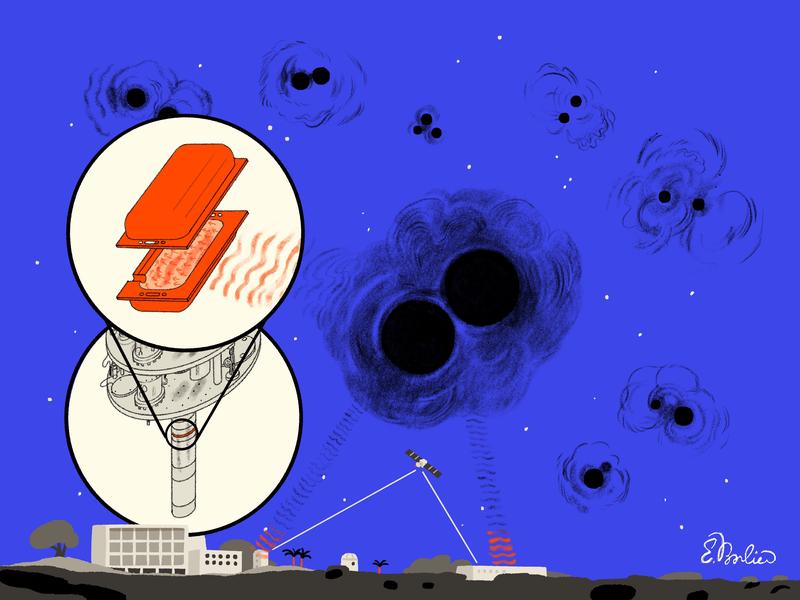Highlight
GravNet: A Global Network for the Search for High-Frequency Gravitational Waves Receives ERC Synergy Grant 2024
November 5, 2024
- GravNet is the first dedicated effort to detect high-frequency gravitational waves. Their detection would open a new observational window into previously unseen astrophysical processes.
- Quantum Technologies and Gravitational Wave detection meet in this project, which proposes innovative table-top detectors for high-frequency gravitational waves.
- ICREA researcher at IFAE Diego Blas participates in the project, alongside three collaborators from leading European institutions.

A groundbreaking project called GravNet: A Global Network for the Search for High-Frequency Gravitational Waves has been awarded an ERC Synergy Grant for 2024. Led by scientists from four European institutions, GravNet aims to develop and deploy a novel experimental platform to detect gravitational waves (GWs) in the high-frequency range of MHz to GHz. This pioneering effort could revolutionize the study of phenomena such as primordial black hole mergers and ultra-light dark matter, offering answers to some of the most pressing questions about the cosmos.
GravNet is a six-year project in collaboration between Prof. Dr. Matthias Schott, Rheinische Friedrich-Wilhelms-University, Bonn, Germany, Prof. Diego Blas, Instituto de Física de Altas Energías, Spain, Prof. Dr. Dmitry Budker, Johannes Gutenberg University, Mainz, Germany and Dr. Claudio Gatti, National Institute for Nuclear Physics, Italy. The project aims to develop the first dedicated network of detectors for high-frequency gravitational waves (HFGWs). These novel detectors combine the latest quantum sensing technologies with resonant cavities in strong magnetic fields.
“GravNet will open a new window to the Cosmos: we will, for the first time, have the capacity to look at high-frequency gravitational waves with unprecedented precision,” says Diego Blas. “This may allow us to unveil secrets related to the first moments of the Big Bang or to the mysteries of dark matter.”
The Quest for High-Frequency Gravitational Waves
The detection of high-frequency gravitational waves represents the next frontier in the intersection of fundamental physics, astrophysics and metrology. Since the first detection of gravitational waves by LIGO in 2015, scientists have been able to probe the universe in the frequency range from 10 Hz to 10 kHz. However, vast unexplored bands remain, including the MHz to GHz range, which could hold the key to understanding fundamental astrophysical events such as the mergers of primordial black holes or the interactions of ultra-light dark matter overdensities.

The GravNet Detection Strategy
GravNet’s approach to detecting high-frequency gravitational waves is based on an innovative use of quantum sensing technologies. In particular, the project utilizes cavities in strong magnetic fields to convert gravitational waves into photons. If the photon’s frequency matches the resonance frequency of the cavity, the signal is amplified and becomes detectable. This method significantly enhances sensitivity to detect HFGWs.
To maximize the chances of detection, GravNet will deploy a network of detectors across multiple European laboratories: Bonn, Mainz, Frascati, and PSI. These detectors will be synchronized using a GPS-based data acquisition scheme, enabling them to function as a unified, highly sensitive array. The combined data from this global network could increase sensitivity to high-frequency gravitational waves by several orders of magnitude.

GravNet Expected Outcomes
The GravNet project is expected to open up a new, vast parameter space for gravitational-wave searches, and to provide the most stringent tests yet of the high-frequency gravitational wave spectrum. By launching a novel detection program that bridges gravitational wave science with cutting-edge quantum sensing technologies (QST), GravNet will foster collaboration between these two scientific communities. The establishment of a European infrastructure for HFGW detection will not only drive groundbreaking discoveries but also lay the foundation for future generations of research, positioning Europe at the forefront of gravitational wave and quantum technology innovation.
About the ERC Synergy Grants 2024
Applicants submitted 548 proposals in the ERC Synergy Grants 2024 call. The 57 winning projects involve 201 researchers who will carry out their projects at 184 universities and research centres in 24 countries across Europe and beyond.
The winning projects will receive a total of €571 million to address some of the most complex scientific problems, covering a wide range of disciplines. The ERC Synergy Grants foster collaboration between outstanding researchers, enabling them to combine their expertise, knowledge and resources to push the boundaries of scientific discovery. This funding is part of the EU’s Horizon Europe research and innovation programme.
- Additional Material
- ERC Press release
- IFAE Research group
- Theory Division
- Contact
